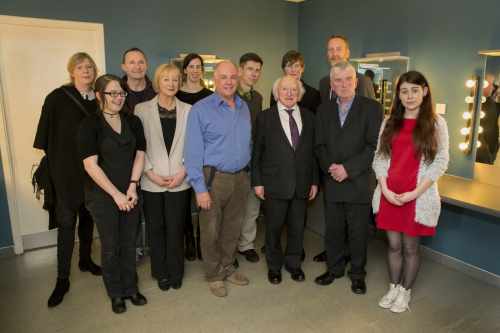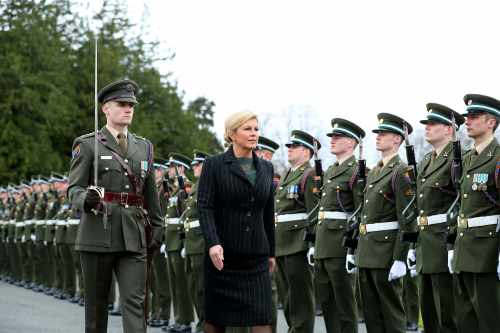Speech at Michael Colgan’s “Farewell Festival”
The Gate Theatre, Dublin, 26th March 2017
Dear friends,
It is my great pleasure to join you all this evening in this beloved theatre, where so many memories of dramatic triumphs "linger like nostalgic ghosts"; it is a pleasure to be on this stage, where, evening after evening, the overwhelming, the tragic, the absurd, the comic, the magical, are brought to life; and it is, of course, a particular pleasure to have this opportunity to bid farewell to Michael Colgan through this magnificent tribute to three giants among playwrights: Samuel Beckett, Harold Pinter, and "the Master", Brian Friel.
May I thank Ingrid Craigie, Sinéad Cusack, Jeremy Irons, Barry McGovern and Ralph Fiennes for their reading, in splendid simplicity, from the works of the great men. The compelling prose and poetry we have been listening to this evening - attentively, in silence - are the best possible homage to Michael Colgan's artistic vision as Director of The Gate Theatre - a vision that has text, and words, at its heart. Indeed, as Samuel Beckett once said, "words are all we have" ["C'est les mots ; on n'a rien d'autre"].
Thank you, then, Barry, Ingrid, Sinéad, Jeremy and Ralph for giving voice, and heart, and soul, to those words. The magic of acting surely lies in that ability to touch and move us by "transcending technique and the memorization of lines" and lending life - a life at once unique, ephemeral, and precious - to the texts we love.
This was also how Brian Friel saw it, who counted as one of the "joys and satisfactions" of his life in the theatre "the experience of working with actors in the rehearsal room." Brian Friel did in fact consider the contribution of actors as considerably more vital to the theatrical process than that of directors. In the festival booklet co-published by the Gate and the Abbey on the occasion of his 70th birthday, Friel thus remarked that for over two and a half thousand years, there had been no such thing, in theatre, as a theatre director.
Michael Colgan would certainly agree with this. Indeed, in a recent interview, Michael said, with that distinctive blend of self-deprecation and immodesty that is his trademark:
"I can't sing, or act, and I can't even really direct, but I think if I have any talent, it's being persuasive...I persuade someone to let us put the play on, then I persuade someone to direct it, then I persuade people to come and see it."
Well, we are immensely grateful to Michael Colgan for having so effectively managed to persuade such a rich variety of talented people to come and work with him during his three decades at the helm of The Gate; we are grateful for Michael's skill at luring to Dublin actors and artists of the greatest ability and distinction from across the world; we are grateful for his ability to bring the finest of theatre to both Irish and international audiences; and we are grateful, too, for the integrity of the artistic choices he has made on behalf of The Gate Theatre.
Michael Colgan has brilliantly risen to the great challenge that it was to continue the work of the iconic founders of The Gate Theatre, Micheál MacLiammóir and Hilton Edwards. It was them who, from the late 1920s, made of this theatre a place where such great actors as James Mason or Orson Welles performed, a place where Irish audiences were acquainted with new subjects and styles, and with an eclectic repertoire that embraced the works of Aeschylus, William Shakespeare, Molière, Henrik Ibsen, August Strindberg, Anton Chekhov, Eugene O’Neill, Arthur Miller, but also the plays of such Irish dramatists as George Bernard Shaw, "An Philibin", Denis Johnston, T.C. Murray, Mary Manning, as well as, of course, the earliest works of Brian Friel.
As the second Director of The Gate, Michael Colgan has, in his turn, remarkably managed to marshal the theatre through the ups and downs of Ireland's cultural and economic life, and through the multiples shifts in taste the dramatic arts have undergone over the last thirty years.
Michael must be credited, too, for contributing to doing justice to Samuel Beckett's genius in this country. Many of us here tonight will remember the huge achievement that was the 1991 Beckett festival, when all of Beckett's 19 plays were put on at The Gate. We also recall the milestone all-Ireland tour of 2008, when The Gate's acclaimed production of Waiting for Godot was shown for one night only at 40 venues across each of Ireland's 32 counties.
On behalf of everybody here, may I thank you, Michael, for the great service you have rendered, for over a third of a century, to the cause of theatre in this country. We thank you for all those wonderful plays, for all those nights you have enabled us to spend in awe, stupefaction and laughter, reflecting over "the brevity of human glory", recalling that "the sky can still fall on our heads", and encountering unexpected truths - truths which, as Harold Pinter put it in his Nobel Lecture (2005), "challenge each other, recoil from each other, reflect each other, ignore each other, tease each other, are blind to each other."
I wish you, Michael, the very best in all of your future endeavours; I wish Selina Cartmell well in her new role as Artistic Director of The Gate; and I wish us all, dear friends, countless more nights of theatrical wonder in this great Dublin theatre. May I now leave you with one of the "secular prayers" which Brian Friel offered to those who dedicate their life to theatre:
“A heartfelt prayer for all the creative people who will work here in the coming decades and donate their lives to that strange and almost sacred pursuit we call theatre - because donating their lives is what they do. I pray that they find their reward in putting us in touch again with our deepest souls, of lifting us up again to those neglected values that we need to embrace if we are to be fully human. I solemnly pray that they will indeed find great, great reward in that unique venture.”
Go raibh míle maith agaibh go léir.


